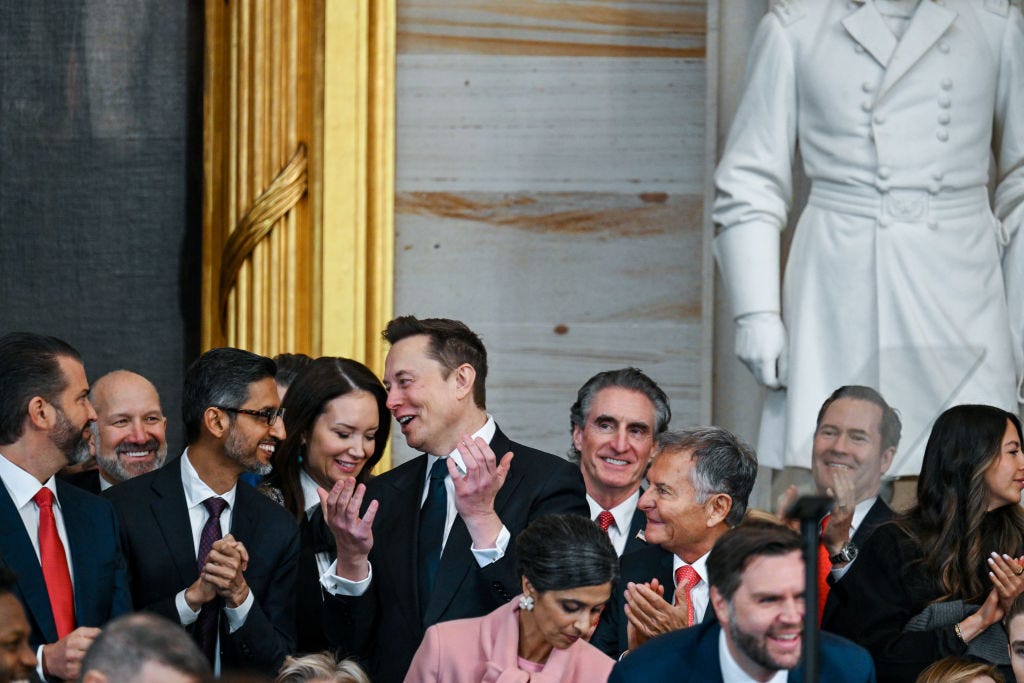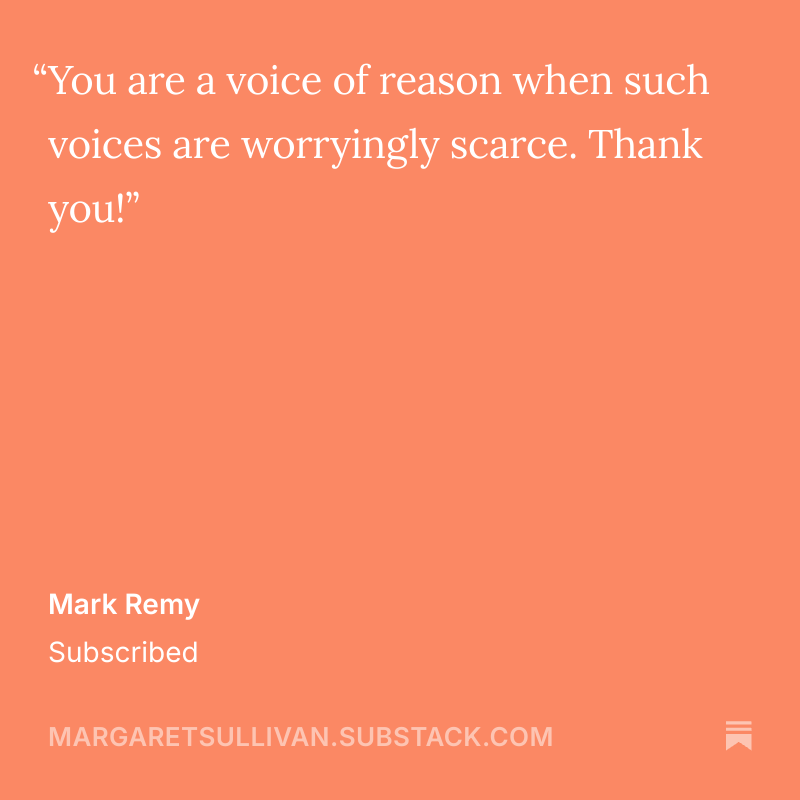The split personality of Big Journalism in covering this nightmare
The reporting is essential. But what about the ability to make sense of the chaos and sound the alarm?
On Friday, three reporters at the Washington Post broke a huge story. It might have sounded like some kind of bureaucratic development inside the federal government, but it was much more important than that.
The headline: “Senior U.S. official exits after rift with Musk allies over payment system.” Marked “exclusive,” it was written by Jeff Stein, Isaac Aarndorf and Jacqueline Alemany, and it should have sent shivers down the spine of every American: “The highest ranking career official at the Treasury Department left the agency after a clash with allies of billionaire Elon Musk over access to sensitive payment systems …” And the article (gift version here) went on to say that David Lebryk, who had served for decades in nonpolitical roles at Treasury “had a dispute with Musk’s surrogates over access to the payment system the U.S. government uses to disburse trillions of dollars every year.” The systems “are responsible for distributing Social Security and Medicare benefits, salaries for federal personnel, payments to government contractors and grant recipients, and tax refunds.” That’s $6 trillion in federal funds. Normally, only a few career employees, nonpolitical types, have access.

Then on Saturday, the New York Times had its own related blockbuster: “Elon Musk’s Team Now Has Access to Treasury’s Payment Systems.” Reported by Andrew Duehren, Maggie Haberman, Theodore Schleifer and Alan Rappeport, the article (gift version here) noted that the Musk allies who have been granted access to the payment system were made Treasury employees and obtained security clearances. One of those who now has access to the payment system is Tom Krause, the chief executive of a Silicon Valley company, Cloud Software Group.
Some commentary:
“This amounts to the most significant data leak in cyber history. Private individuals in the data business now have access to your Social Security information. This violates privacy laws in every state.” — Stuart Stevens, formerly a ranking Republican strategist and now an author. (Posted on X)
“As someone who spent a decade studying how centralized information system are used for coercion, this is a five alarm fire. We need to name it, identify risks, and seek to mitigate their impacts. … If you have access to payments and data, you can shut opponents off from key resources.” — Abe Newman, co-author of “Underground Empire: How American Weaponized the World Economy.” (Posted on Bluesky)
“This is a coup. Congress has the power of the purse, not the world’s richest unelected shadow president.” —New York Times commenter
Yes, it’s a huge deal, and we wouldn’t know about it (at least not right now) if it weren’t for those seven reporters I named, and others like them. That’s important to acknowledge. Those who trash the Washington Post, in understandable protest of its owner’s malfeasance, might take note.
Yet, when I looked for that story on major news sites late Sunday morning, it was not being shouted from the rooftops. The Times and the Post had it high up, but it was not nearly the lead story on their apps; CNN barely noted it online at that time — an “analysis” piece, far down the list, said: “We do not know what exactly Elon Musk is doing to the federal government.” Groundhog Day got far more prominence there. I couldn’t find it on the CBS News site at all; maybe, to put the kindest possible spin on it, reporters there were working to confirm the story. CNN’s Jennifer Hansler and Alex Marquardt did break an important story Sunday, that two top security officials at the US Agency for International Development were put on administrative leave over the weekend after they refused to let Musk-associated interlopers access the systems at the agency.
So, yes, we should appreciate all of this essential reporting. And yet, overall, the mainstream media is having as much trouble covering Trump’s firehose of chaos as it did covering his campaign.
One reason is sheer overload — somewhat understandable given what has happened in a matter of days. Trump has released Jan. 6th criminals, started a trade war with America’s allies, blamed a tragic plane crash on DEI, targeted transgender people with a series of executive orders, enriched himself with a crypto meme scam, and nominated for cabinet positions a rogue’s gallery of the unqualified.
The scholar Norman Ornstein had this to say: “We are in the middle of a fast moving putsch, a right wing authoritarian coup, a five alarm fire, and our media are treating it as if it were a little backyard bonfire.”
Do you agree with Ornstein? What could the news media do differently in your view?
A few other troubling notes: Los Angeles Times owner, the billionaire Patrick Soon-Shiong, caused further questions about his paper’s editorial independence by sharing on social media a Times op-ed about RFK Jr., which caused the piece’s author to object that his viewpoint was not represented accurately. (I misstated Soon-Shiong’s involvement in an earlier version of this post.) And CBS News’s parent company, Paramount, appears in danger of settling a legal claim by Trump over the (unobjectionable) way Sixty Minutes handled its interview with Kamala Harris during the campaign. There is virtually no legal basis for Trump’s complaint; it’s a power play and effort to intimidate. Paramount absolutely should resist but may not because of fear that the merger it seeks with another media company could be a casualty of fighting Trump in court.
My overall feeling — and message — is that we need the American press to be at its best right now. This is a full-on crisis, one of the worst in our history. I’m going to keep pressing for that here and in my columns for the Guardian US.
I will end on a slightly different note, after hearing last week from Jill Abramson, the former top editor of the New York Times. She disagreed strongly with a criticism of the Times included in my last post from longtime journalism professor Jeff Jarvis. He knocked a story quoting Trump voters and their desires for America as “stenography” that allowed misinformation to circulate unchecked.
Abramson, who writes a column for the Boston Globe, and was a senior lecturer in Harvard’s English Department from 2014 to 2023, made the case that such pieces are useful and she defended this particular one. I’ll be interested, readers, in what you think. She wrote:
I think Jarvis is off the mark. The Times’s huge news report, with every aspect of Trump’s radical policy and government changes, has been, overall, plenty tough-minded. Peter Baker, the lead reporter, has written about Trump’s executive power grab from every angle almost daily, in my view. And the reactions of Trump supporters … should be part of the inaugural coverage. Those people exist in big numbers. They have to be covered. Their unvarnished words help me understand them and how they could worship such a despicable leader. I saw the article and photos as a Voices piece, (which the NYT often does at big news moments) not as sanewashing.
Thanks to all for caring about the relationship between the press and democracy at this critical moment. There is no paywall here (I removed it in November, after the election in the hope of being useful to more people in this new era), but your subscriptions not only support this effort but provide encouragement.
Hang in there, everyone. Think about how you can help the most vulnerable. They’ll bear the brunt.







When WIRED Magazine is more on top of a political story than any of the supposed major media outlets, you know that the corporate media has rendered itself truly irrelevant. What Musk is doing is beyond illegal. The NYT, the WaPo, the networks, all should be screaming about this because the implications for the country are terrifying. What will it take?
I watched the beginnings of the coup unfold Friday night on the Alt National Park's Facebook page. Reuters was the only outlet reporting on it at the time, Rachel Maddow picked it up on her show after being alerted. The fact that it took 24 to 48 hours to surface in big news outlets was absolutely terrifying. It was a sleepless weekend. It is deeply upsetting that it wasn't front and center everywhere, boldly describing what it is.
Mainstream reporting kept focusing on the consequences rather than the why. The headlines were about firings or resignations and totally missing the point. The story was quickly buried in other stories at the bottoms of their website pages when it should have been pinned and highlighted at the top of every communication channel, website, etc.
Do you have any insight into why legacy media is failing to recognize and prioritize what is perhaps the most important story since the Civil War? This is a government takeover and they should be calling on Americans to shut down and take to the streets because that is what it is going to take to overcome this.